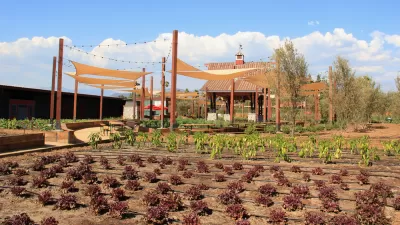With a year-round temperate climate and a history of widespread urban agriculture, it's a shame that Los Angeles now finds itself ranked 43rd amongst America's 50 largest cities for their support of local food. Can L.A. turn back the clock?
The good news, according to Willy Blackmore, is that if Los Angeles devoted just 9 percent of its urban land to crops, it could produce enough food to feed its residents. The bad news, for now, is that with only 6,000 acres of land in L.A. County devoted to growing food, the area is about 63,000 acres short of becoming "a self-sustained urban farming mecca."
Blackmore profiles a group of activists that are trying to turn the bad news into good news by pushing, "the city's agricultural policy further into the 21st century-and into the upper ranks of American cities with progressive urban agriculture agendas."
"'We all want to grow food and we want it to be easy,' says Francesca De la Rosa, co-chair of the Los Angeles Food Policy Council's working group to advocate for urban agriculture policy in the city. That would mean limiting bureaucratic hurdles, clarifying the rules, and extending some base-level incentives to urban agriculturalists-from overhauling the city's free compost and mulch giveaway programs to extending the reduced water-usage rate that big agriculture enjoys for smaller edible landscaping and gardening projects."
According to Blackmore, "Activists are also encouraging L.A. to find farming opportunities in its own backyard-the city's underused public parks, city-owned vacant lands, schools, hospital grounds, green spaces between the sidewalk and the street-even its prison yards. To push the issue, L.A.-based edible landscaping outfit Farmscape has launched a stunt campaign to elect the company mayor under a platform to 'bring farms back to the city.'"
FULL STORY: Lifestyle Growing Pains: Why Is L.A. So Hard on Urban Farmers?

Planetizen Federal Action Tracker
A weekly monitor of how Trump’s orders and actions are impacting planners and planning in America.

Maui's Vacation Rental Debate Turns Ugly
Verbal attacks, misinformation campaigns and fistfights plague a high-stakes debate to convert thousands of vacation rentals into long-term housing.

San Francisco Suspends Traffic Calming Amidst Record Deaths
Citing “a challenging fiscal landscape,” the city will cease the program on the heels of 42 traffic deaths, including 24 pedestrians.

Amtrak Rolls Out New Orleans to Alabama “Mardi Gras” Train
The new service will operate morning and evening departures between Mobile and New Orleans.

The Subversive Car-Free Guide to Trump's Great American Road Trip
Car-free ways to access Chicagoland’s best tourist attractions.

San Antonio and Austin are Fusing Into one Massive Megaregion
The region spanning the two central Texas cities is growing fast, posing challenges for local infrastructure and water supplies.
Urban Design for Planners 1: Software Tools
This six-course series explores essential urban design concepts using open source software and equips planners with the tools they need to participate fully in the urban design process.
Planning for Universal Design
Learn the tools for implementing Universal Design in planning regulations.
Heyer Gruel & Associates PA
JM Goldson LLC
Custer County Colorado
City of Camden Redevelopment Agency
City of Astoria
Transportation Research & Education Center (TREC) at Portland State University
Jefferson Parish Government
Camden Redevelopment Agency
City of Claremont



























